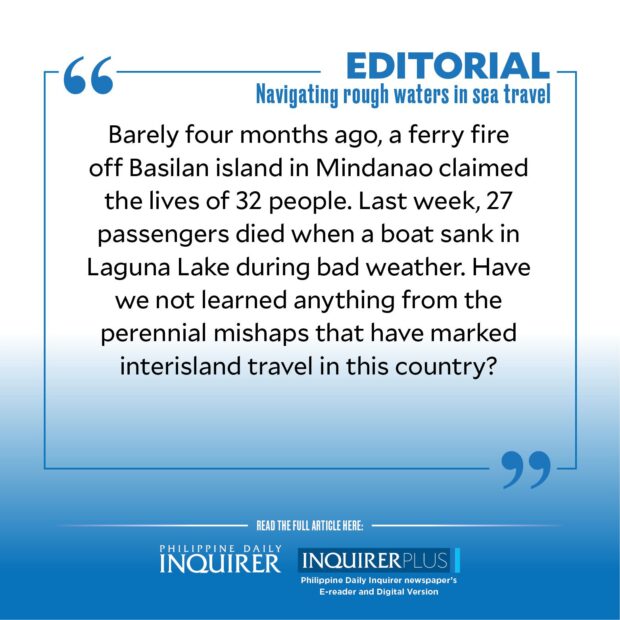Navigating rough waters in sea travel
Barely four months ago, a ferry fire off Basilan island in Mindanao claimed the lives of 32 people. Last week, 27 passengers died when a boat sank in Laguna Lake during bad weather. Have we not learned anything from the perennial mishaps that have marked interisland travel in this country?
The loss of lives could have been avoided if only authorities had enforced the most basic safety and regulatory protocols for sea transport. Unfortunately, the mounting death toll from sea mishaps in the past three decades has yet to touch the government’s conscience enough to plug the gaping loopholes that make sea transport in this maritime nation anything but safe.
Article continues after this advertisementIt was a perfect storm that doomed motorized boat Princess Aya, which was ferrying passengers from a port in Barangay Kalinawan to Talim Island, both in Binangonan, Rizal province, on July 27. Strong winds on the tail of Typhoon “Egay” were still lashing parts of Luzon, although authorities had lifted typhoon signals and allowed small vessels to sail.
Even as survivors and the vessel’s captain said that a sudden storm surge had caused steep waves to swamp the boat, it appears to be a man-made disaster waiting to happen, with negligence, greed, and dereliction of duty by a government agency as major factors.
The boat was overloaded and carried at least 70 passengers, way above its capacity of 42. Only 22 names were listed in the manifest, with the boat reportedly going back to port several times to load more people. No personnel of the Philippine Coast Guard (PCG) were on hand to conduct an actual count, and to make sure that the passengers were wearing a life vest before the vessel was allowed to sail. As in previous accidents, life vests could have saved a lot of lives, and wearing one is a basic safety requirement for sea travel.
Article continues after this advertisementThe high death toll was inevitable, with most passengers not knowing how to swim—an irony for a nation of more than 7,000 islands—and a number of them trapped under heavy tarpaulins used to shield the boat from the rains. So far, 27 bodies have been fished out of the churning waters, while 43 passengers survived.
As families mourned, the expected finger-pointing and buck-passing commenced. Predictably, lawmakers have called for hearings in aid of legislation.
What is needed is for President Marcos to demand immediate action and accountability from the PCG, the Maritime Industry Authority (Marina), and their mother agency, the Department of Transportation and Communications. While the PCG has dismissed several personnel for falling short of their duty to implement maritime safety protocols, its overreaching functions should be reviewed as well since the agency is also in charge of marine environmental protection, search and rescue operations, and patrolling the disputed waters within our exclusive economic zone for interlopers.
If the PCG is woefully ill-equipped to do its extensive job, the government should provide it budgetary support to hire more personnel, and direct other agencies to share its load by conducting official port inspections and enforcing safety protocols at the point of departure. There should be a clearer delineation of functions and a more equitable division of responsibility among maritime agencies and local government units.
Ensuring that passenger vessels are seaworthy and equipped with life vests and trained personnel are among the weakest points in the sea transport system. This is the turf of the Marina which, time and again, has failed to enforce maritime safety through its anomalous and corruption-ridden issuance of certificates of public convenience.
Clearly, reforms are needed, and needed yesterday at the PCG and Marina.
Technically, there is no law requiring the wearing of life vests in sea vessels, unlike the use of seat belts in cars that became mandatory under Republic Act No. 8750, or the Seat Belts Use Act of 1999, as a response to the increasing number of deaths due to car accidents.
But the use of life jackets is spelled out under Marina’s Memorandum Circular No. 2018-06, which mandates all vessels to have the required number of life vests for passengers and crew, and in common areas within easy reach of passengers in an emergency. The memo also calls for proper signage and information on how to use the vests. But the memo circular apparently lacks teeth, and is routinely violated by ship operators and ignored by passengers. A law making mandatory the wearing of life vests before a vessel is allowed to sail, with stiff penalties for violators, could be among the measures that can prompt compliance with safety protocols, and make ship operators and regulators accountable.
There is also a need for increased safety consciousness by the public, who often prioritizes convenience or cost over safety. But the rules should be there in the first place, with authorities seen to be uncompromising in fully implementing them. The death toll from this habitual setting aside of safety requirements is simply too high to be tolerated.

















